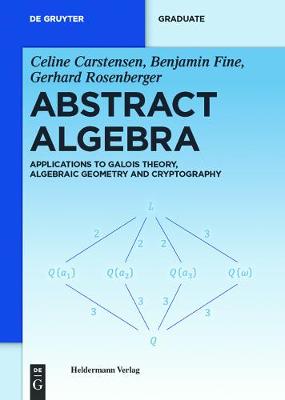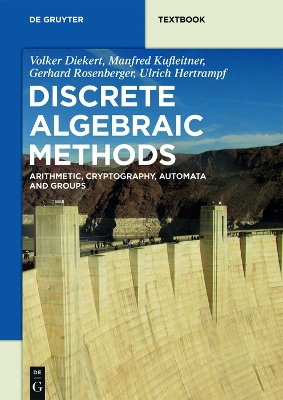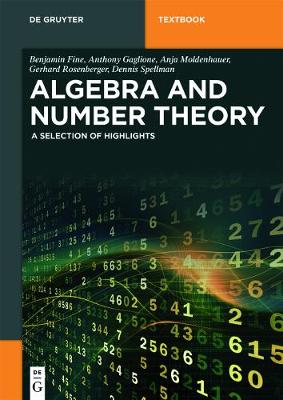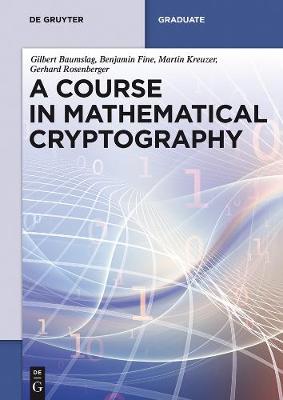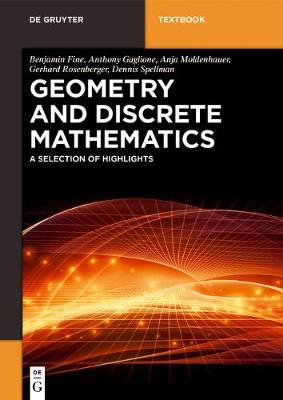De Gruyter Textbook
6 total works
Abstract Algebra
by Gerhard Rosenberger, Benjamin Fine, and Celine Carstensen
Published 1 January 2011
A new approach to conveying abstract algebra, the area that studies algebraic structures, such as groups, rings, fields, modules, vector spaces, and algebras, that is essential to various scientific disciplines such as particle physics and cryptology. It provides a well written account of the theoretical foundations; also contains topics that cannot be found elsewhere, and also offers a chapter on cryptography. End of chapter problems help readers with accessing the subjects.
This work is co-published with the Heldermann Verlag, and within Heldermann's Sigma Series in Mathematics.
This work is co-published with the Heldermann Verlag, and within Heldermann's Sigma Series in Mathematics.
Discrete Algebraic Methods
by Volker Diekert, Manfred Kufleitner, Gerhard Rosenberger, and Ulrich Hertrampf
Published 24 May 2016
The idea behind this book is to provide the mathematical foundations for assessing modern developments in the Information Age. It deepens and complements the basic concepts, but it also considers instructive and more advanced topics. The treatise starts with a general chapter on algebraic structures; this part provides all the necessary knowledge for the rest of the book. The next chapter gives a concise overview of cryptography. Chapter 3 on number theoretic algorithms is important for developping cryptosystems, Chapter 4 presents the deterministic primality test of Agrawal, Kayal, and Saxena. The account to elliptic curves again focuses on cryptographic applications and algorithms. With combinatorics on words and automata theory, the reader is introduced to two areas of theoretical computer science where semigroups play a fundamental role.The last chapter is devoted to combinatorial group theory and its connections to automata.
Contents:
Algebraic structures
Cryptography
Number theoretic algorithms
Polynomial time primality test
Elliptic curves
Combinatorics on words
Automata
Discrete infinite groups
Contents:
Algebraic structures
Cryptography
Number theoretic algorithms
Polynomial time primality test
Elliptic curves
Combinatorics on words
Automata
Discrete infinite groups
Algebra and Number Theory
by Benjamin Fine, Anthony Gaglione, Anja Moldenhauer, Gerhard Rosenberger, and Dennis Spellman
Published 11 September 2017
This two-volume set collects and presents some fundamentals of mathematics in an entertaining and performing manner. The present volume examines many of the most important basic results in algebra and number theory, along with their proofs, and also their history.
Contents
The natural, integral and rational numbers
Division and factorization in the integers
Modular arithmetic
Exceptional numbers
Pythagorean triples and sums of squares
Polynomials and unique factorization
Field extensions and splitting fields
Permutations and symmetric polynomials
Real numbers
The complex numbers, the Fundamental Theorem of Algebra and polynomial equations
Quadratic number fields and Pell's equation
Transcendental numbers and the numbers e and
Compass and straightedge constructions and the classical problems
Euclidean vector spaces
Contents
The natural, integral and rational numbers
Division and factorization in the integers
Modular arithmetic
Exceptional numbers
Pythagorean triples and sums of squares
Polynomials and unique factorization
Field extensions and splitting fields
Permutations and symmetric polynomials
Real numbers
The complex numbers, the Fundamental Theorem of Algebra and polynomial equations
Quadratic number fields and Pell's equation
Transcendental numbers and the numbers e and
Compass and straightedge constructions and the classical problems
Euclidean vector spaces
A Course in Mathematical Cryptography
by Gilbert Baumslag, Benjamin Fine, Martin Kreuzer, and Gerhard Rosenberger
Published 27 May 2015
Cryptography has become essential as bank transactions, credit card infor-mation, contracts, and sensitive medical information are sent through inse-cure channels. This book is concerned with the mathematical, especially algebraic, aspects of cryptography. It grew out of many courses presented by the authors over the past twenty years at various universities and covers a wide range of topics in mathematical cryptography. It is primarily geared towards graduate students and advanced undergraduates in mathematics and computer science, but may also be of interest to researchers in the area.
Besides the classical methods of symmetric and private key encryption, the book treats the mathematics of cryptographic protocols and several unique topics such as
Group-Based Cryptography Gröbner Basis Methods in Cryptography Lattice-Based Cryptography
Besides the classical methods of symmetric and private key encryption, the book treats the mathematics of cryptographic protocols and several unique topics such as
Group-Based Cryptography Gröbner Basis Methods in Cryptography Lattice-Based Cryptography
Geometry and Discrete Mathematics
by Benjamin Fine, Anthony Gaglione, Anja Moldenhauer, Gerhard Rosenberger, and Dennis Spellman
Published 24 September 2018
This two-volume set collects and presents many fundamentals of mathematics in an enjoyable and elaborating fashion. The idea behind the two books is to provide substantials for assessing more modern developments in mathematics and to present impressions which indicate that mathematics is a fascinating subject with many ties between the diverse mathematical disciplines. The present volume examines many of the most important basic results in geometry and discrete mathematics, along with their proofs, and also their history.
Contents
Geometry and geometric ideas
Isometries in Euclidean vector spaces and their classification in n
The conic sections in the Euclidean plane
Special groups of planar isometries
Graph theory and platonic solids
Linear fractional transformation and planar hyperbolic geometry
Combinatorics and combinatorial problems
Finite probability theory and Bayesian analysis
Boolean lattices, Boolean algebras and Stone's theorem
Contents
Geometry and geometric ideas
Isometries in Euclidean vector spaces and their classification in n
The conic sections in the Euclidean plane
Special groups of planar isometries
Graph theory and platonic solids
Linear fractional transformation and planar hyperbolic geometry
Combinatorics and combinatorial problems
Finite probability theory and Bayesian analysis
Boolean lattices, Boolean algebras and Stone's theorem
Set Highlights in Algebra and Geometry
by Benjamin Fine, Anthony Gaglione, Anja Moldenhauer, Gerhard Rosenberger, and Dennis Spellman
Published 8 October 2018
